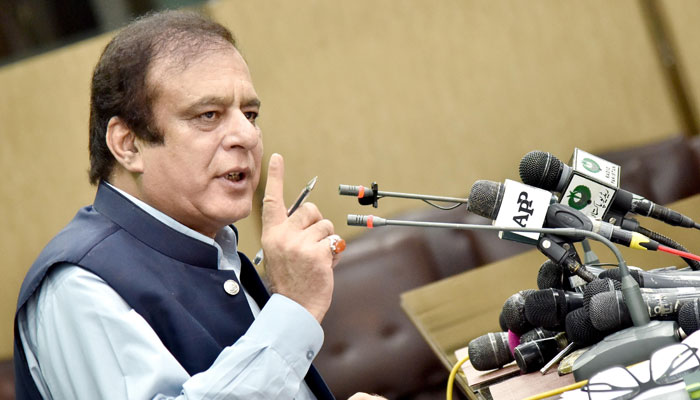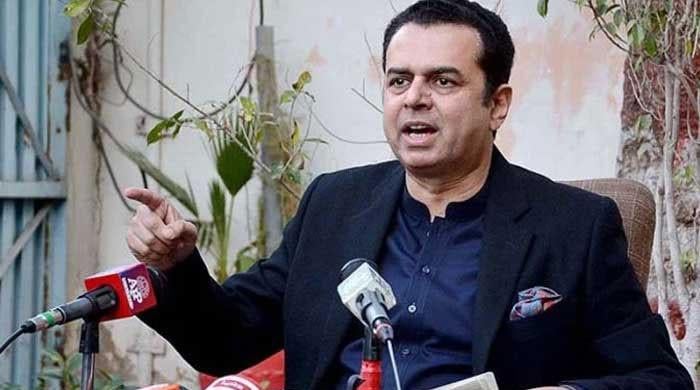PPP responsible for Karachi's dismal state: Shibli Faraz
"Whether it is coronavirus or any other matter, Sindh has always politicised it," says the information minister
August 26, 2020

Minister for Information and Broadcasting Senator Shibli Faraz on Wednesday said PPP is responsible for Karachi's dismal state and is only blaming the Centre to hide its own shortcomings.
The minister's comments came a day after heavy rains lashed Karachi, causing damage to infrastructure, gutters to overflow, roads to be flooded, and prolonged power outages, among other miseries. One person was also reported to have died in a rain-related incident.
Addressing a press conference in Islamabad alongside Federal Minister for National Food Security and Research Syed Fakhar Imam, he said: "PPP said they would transform Larkana into Karachi. Instead, they did the opposite, and turned Karachi into Larkana."
Faraz said that the party is blaming the federal government to cover up its own incompetence and inefficiency. "Whether it is coronavirus or any other matter, Sindh has always politicised it."
"God is exposing Bilawal Bhutto Zardari and Chief Minister Sindh [Murad Ali Shah]," he said, adding that the province had not blamed the Centre for rains, until now.
Talking about Nawaz Sharif's repatriation, he rejected the notion that the government was engaging in "point-scoring" over the matter.
Faraz said that the former premier had left the country "under the guise of treatment". "He made false statements," the information minister added.
"Looking at his photos, it is clear he has broken the law," Faraz said.
He said that Nawaz is taking care of politics alongside his health, referring to a photograph of the PML-N supremo out on a walk with his son.
Faraz said that the government would avail all legal options to bring Nawaz Sharif back to face the law of the land.
He said that the opposition parties were united only on the issue of protecting plundered national wealth, otherwise they had different agendas. "We face no threat from them."
The information minister said that the meeting between Shehbaz Sharif and Fazlur Rehman ended in a fiasco and Bilawal and Shehbaz had opposing views on many issues.
He said that the opposition was trying to instigate the people against incumbent government but they would fail in their nefarious designs.
Earlier, while addressing the press conference, he said Prime Minister Imran Khan was worried about high prices of edible items in the country and personally monitoring the steps being taken to give relief to the poor.
He said that the premier has been chairing high level meetings and issuing directives to bring prices of essential items down.
The minister said that hoarding was one of the main reasons for a rise in wheat flour prices and the government would take strong action against such elements who fleece the poor for their own benefit.
He said that the government has taken concrete steps to counter hoarding and the import of wheat was one major initiative, so that the consumers could get the commodity at affordable rates.
‘Shortage of wheat to end soon’
Meanwhile, Imam said that the shortage of wheat had started in the country a few months ago, but with the government’s measures, it would soon end.
“The wheat and flour crisis had started a few months ago […] the prices of wheat had increased gradually,” Imam said.
"The hoarders kept a close look at support price,” he said, adding that they earned profits from hoarding.
The minister noted that primarily, it was the responsibility of the provinces to take steps and measures necessary against the menace.
He said that there is a shortage of 1.5 million tonnes of wheat in the country and at least 63,000 tonnes of wheat has been imported and had reached Karachi port.
“Due to the imported wheat, the prices of the wheat will reduce,” Imam said.
“By September, more than 800,000 tonnes of wheat will reach the country […] it has been decided that the commodity will be imported through Trading Corporation of Pakistan (TCP),” he said.
He said that the government was also taking steps to provide high quality seeds to farmers.
“45 tonnes of cottonseed is required [...] the government is working on procuring 30 tonnes of high quality seeds for now,” Imam said.
Speaking further on imports, the minister said that Pakistan imports at least 2.5 billion worth of oil.
“Last year, 129,000 tonnes of mangoes were exported,” Imam said. “Despite coronavirus, mango exports will be higher this year.”









